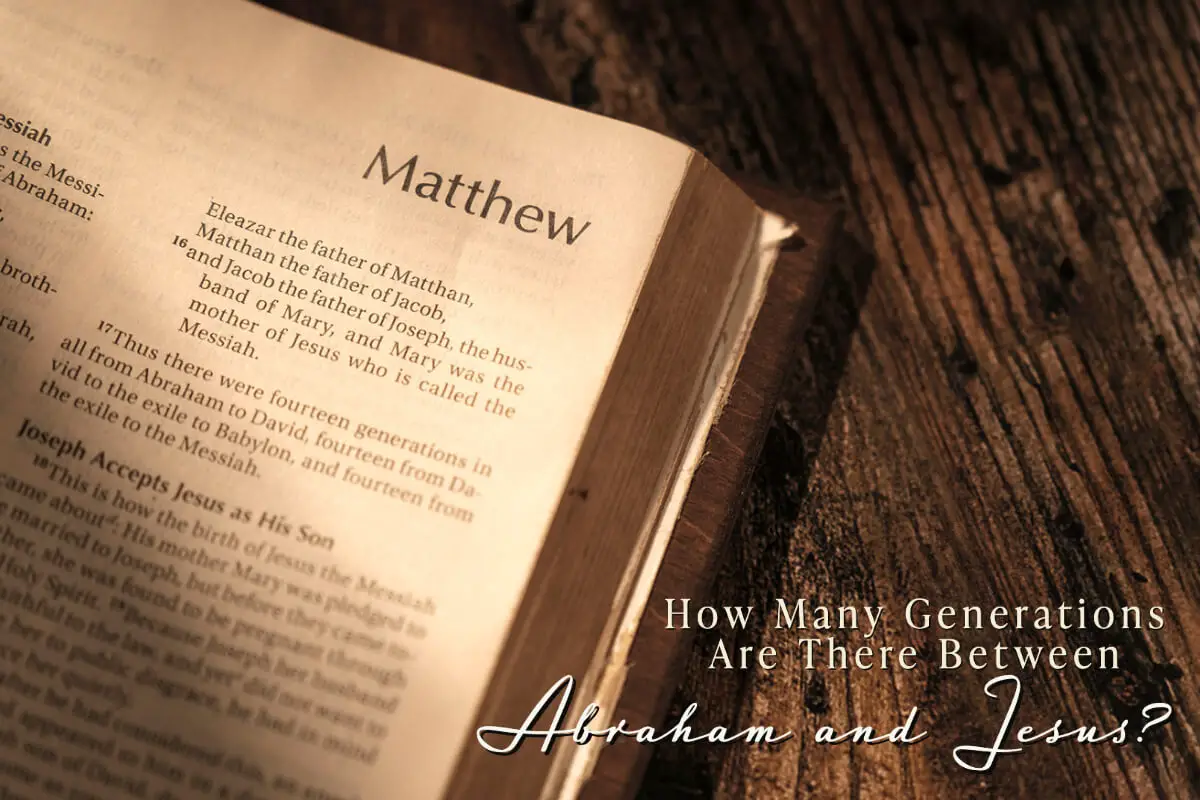An interesting question is how many generations there are between Abraham and Jesus and why it even matters. This does matter because Matthew wrote this in the first chapter of his book- The Book of Matthew, at the very beginning of the New Testament.
There are 42 generations between Abraham and Jesus. Matthew divided these generations into two or three sections, with 14 generations each. The first section is from Abraham to King David, the second 14 generations are from King David to Babylon, and the last 14 are from Babylon to Jesus Christ. In writing this, Matthew established that Christ came from the correct lineage and was the Messiah
Table of Contents
- 42 Generations Between Abraham And Jesus
- Why Did Matthew Choose To Start His Book With Jesus’ Genealogy?
- The Genealogy Establishes Kinship
- Matthew’s Genealogy Is A Testimony Of Christ
- Matthew Speaks Of David The King
- Show Abraham’s Promise Was Fulfiled
- Establishes Abraham As A Father Of Faithful
- Shows Matthew Understood Biblical History
- The Genealogy Is The Bridge Between The Old And New Testament
- Shows There Is Order In How It Was Organized
- Frequently Ask Question
- Related Content
42 Generations Between Abraham And Jesus
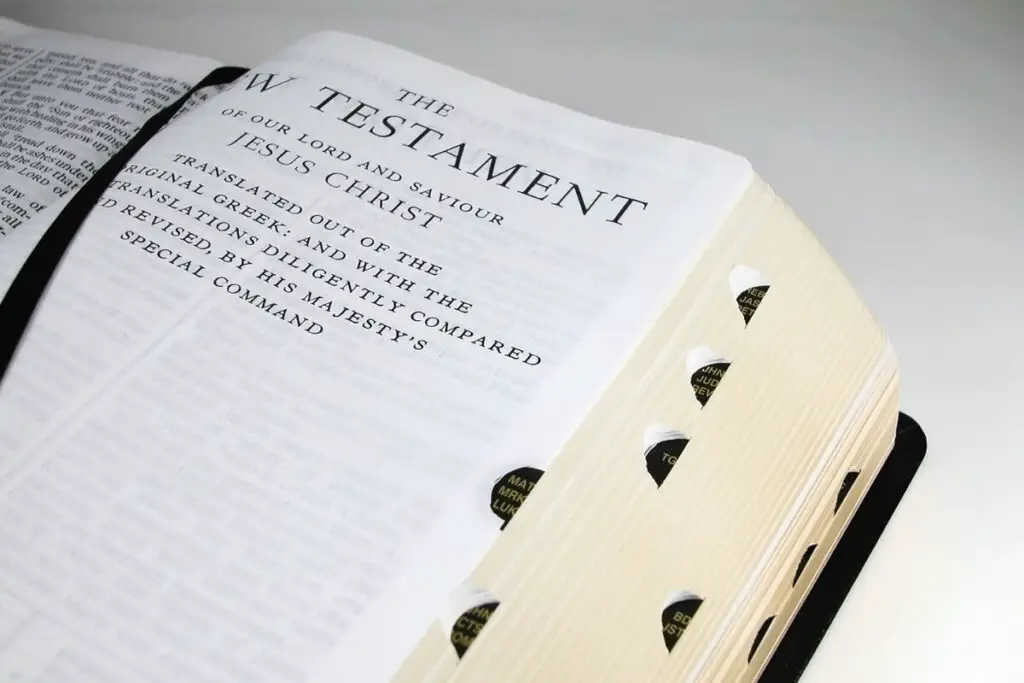
There are 42 generations between Jesus and Abraham. The first book of Matthew lists, from verse 1 until verse 17, all of the genealogy of Jesus. He did this because he wanted to show that Jesus came directly from Abraham’s line and that the Messiah whose birth he was going to testify of was actually who he said he was.
Matthew carefully divided up Christ’s genealogy into three different groups, with 14 generations in each group.
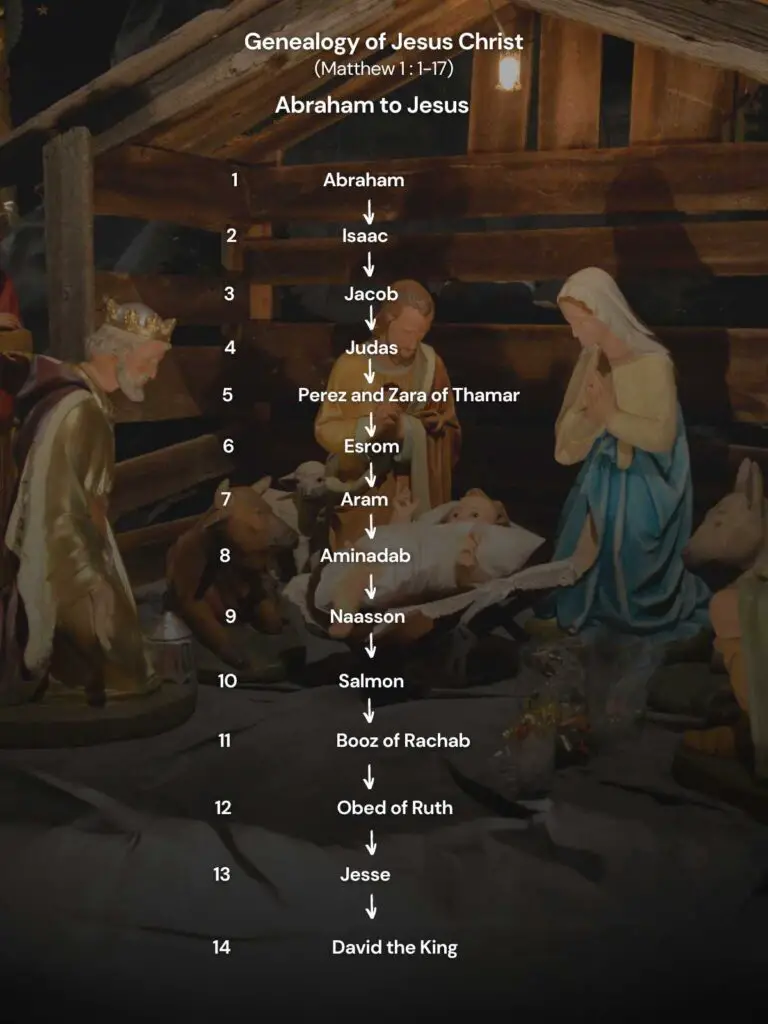
From Abraham To King David – 14 Generations
The first group he talks about is the generations from Abraham to King David, or 14 generations. If you look at all the names he has listed, it is precisely 14 generations from Abraham down to King David. This 14 generation ends with King David.
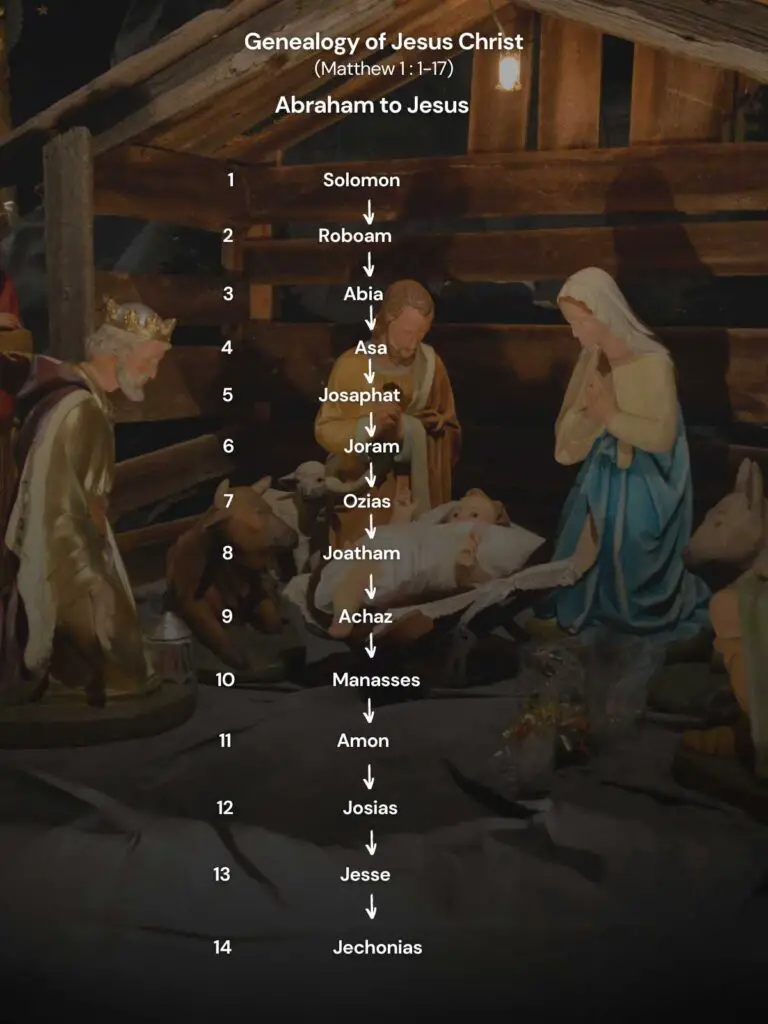
From King David Until Babylon – 14 Generations
The next group that Matthew mentions is from King David until they are carried away into Babylon. This section starts with David’s Son Solomon and ends with Josias. Josias’ son Jechonias is carried away in Babylon and starts the final section of 14 generations.
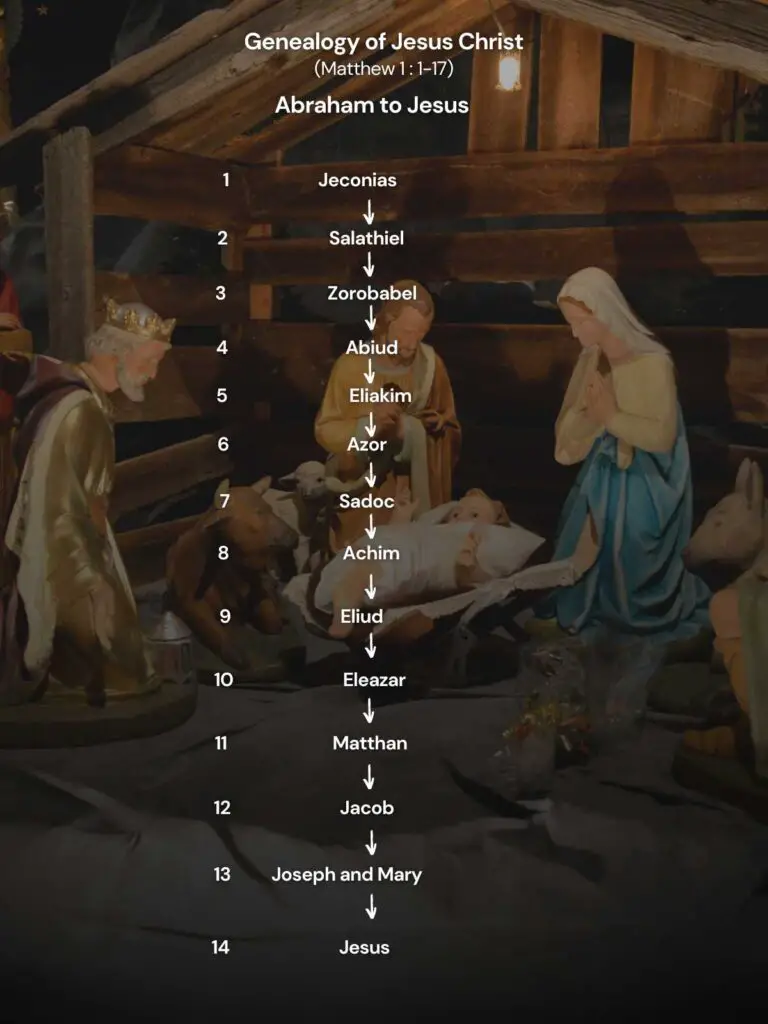
Babylon Until Jesus – 14 Generations
The final section is from Jechonias to Joseph, the father of Jesus, and Mary is another 14 generations until Jesus Christ.
Why Did Matthew Choose To Start His Book With Jesus’ Genealogy?
In the book of Matthew, Matthew was extremely clear about the genealogy of Jesus. He recounted the genealogy into three sections, each with 14 generations. Matthew shows us the importance of understanding our family history and where we come from.
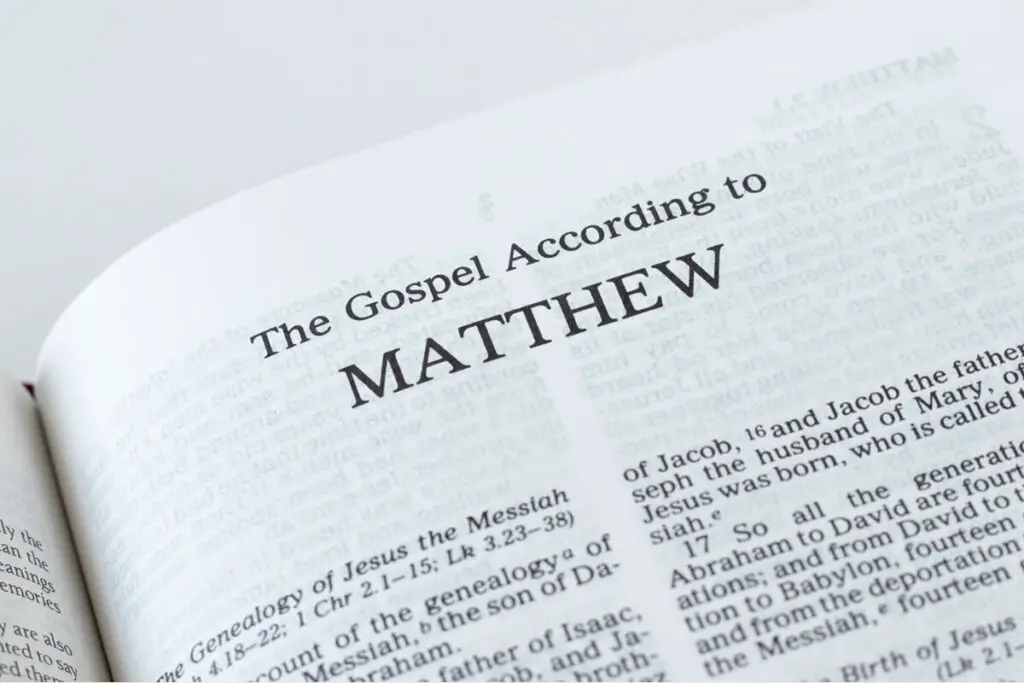
He wanted to show us, as the readers of the New Testament in the Bible, that Jesus Christ was sent directly from Abraham.
Here are some reasons why the genealogy in the book of Matthew was so important:
The Genealogy Establishes Kinship
Matthews’s genealogy of Jesus establishes Jesus’s family, history, background, and kinship. He wanted to show that Jesus was not just some random person but someone from people of importance.
He shows us the baby born in a manger many years ago as the son of God and Jesus Christ. He also wanted to show that Jesus came directly from the lineage of Abraham, King David, and others, who had all prophesied about Christ and his coming to earth.
Matthew’s Genealogy Is A Testimony Of Christ
Matthew’s reciting Christ’s Genealogy and the fact that it is at the very beginning of the New Testament is significant. The story of Christ’s birth is essentially a testimony of Jesus Christ. Matthew is testifying that he knows that Jesus Christ is the son of God as he is giving us information about Christ’s ancestors or where he came from to show this.
Matthew Speaks Of David The King
An exciting part about his genealogy of Jesus is that he is only David. He is called David King. And he calls Christ the son of David. Even though there were other kings in the Genealogy, Matthew only refers to David as king.
Matthew clearly showed how the people viewed King David and his role in Israel during this time.
Show Abraham’s Promise Was Fulfiled
Matthews’s genealogy is also a testimony to Abraham and the promises that were made to Abraham that the Messiah would come through his seed. Another reason why Matthew would give the genealogy of Jesus Christ back to Abraham was to show that God had fulfilled the promises he gave to Abraham.
Establishes Abraham As A Father Of Faithful
Matthew reciting Christ’s Genealogy also clearly establishes Abraham as the father of the faithful or the father of the covenant. Throughout the scriptures, Abraham is often referred to as the father of the faithful or the father of the covenant people; this genealogy also serves as a reminder that this promise was also fulfilled.
Shows Matthew Understood Biblical History
In these few verses at the beginning of Matthew’s book, Matthew shows us that he knows and understands biblical history. He knew who Abraham was. He knew King David, and he knew about Babylon. He knew about the history that had taken place throughout the Old Testament.
We can say that Matthew was indeed a biblical scholar who knew the history of the Old Testament up until the time of Christ’s birth. This, of course, would’ve been important because he would also understand Christ’s story, which would’ve helped solidify his testimony of Jesus Christ as a Messiah.
The Genealogy Is The Bridge Between The Old And New Testament
Matthews’s genealogy also bridges the old and the New Testaments. As it is the first book in the New Testament, he wanted to show who Jesus Christ was and where he came from.
Matthew’s book starts with the book of generations of Jesus Christ, the son of David, the son of Abraham. He wanted to establish that Christ was from Abraham and David’s line.
He also divided the Genealogy from Abraham to David, David to Babylon, and then Babylon to Jesus Christ.
Shows There Is Order In How It Was Organized
One of the things that many of us may miss when we read this genealogy is how there is so much order in the universe. It is interesting to note that from Abraham to David is 14 generations, from David to Babylon is another 14 generations from Babylon to Christ is another 14 generations.
Some say that the number 14 in the Bible can symbolize things such as salvation and Jesus Christ. Clearly, for Matthew, the order that he used the number 14 three times there was a symbol for him and these generations between Abraham and Christ.
When we think about the generations between Christ and Abraham, we can see that there is a lot more for us to understand why this was so important for Matthew to write in the first book of the New Testament.
For Matthew, it was a way for him to testify that Jesus Christ was the son of God and the Messiah and that he came from the correct lineage to be able to fulfill this role.
The Hummel Family is a website all about Family History research. We focus on Swedish, German, English, Scottish, and American Genealogy. We also discussed Asia and China, as we had ancestors who spent many years in China.
You are welcome to join us and become part of our community by signing up for our FREE newsletter, The Hummel Family; sign up by clicking here.
Also, check out our Youtube Channel, Family HIstory Buzz, by clicking here.
Frequently Ask Question
How many generations are there between Abraham and Jesus?
There are traditionally believed to be 42 generations between Abraham and Jesus, as mentioned in the Gospel of Matthew in the New Testament. The specific number of generations and the interpretation of genealogies may vary among different religious traditions and scholarly perspectives.
How is the number of generations calculated?
The number of generations is calculated by counting the direct line of descendants from Abraham to Jesus as mentioned in the biblical genealogies.
Are there any variations in the number of generations between different sources?
Yes, there are some variations in the genealogies mentioned in different biblical sources, resulting in slight differences in the count of generations.
What are the biblical sources that mention the generations between Abraham and Jesus?
The Gospel of Matthew and the Gospel of Luke provide genealogical accounts of Jesus, tracing his lineage back to Abraham.
How does the Gospel of Matthew present the generations?
The Gospel of Matthew presents a genealogy of Jesus through the line of Joseph, listing 42 generations from Abraham to Jesus.
How does the Gospel of Luke present the generations?
The Gospel of Luke presents a genealogy of Jesus through the line of Mary, though it differs from the one in Matthew. It includes 77 generations from Abraham to Jesus.
Are there any gaps or omissions in the genealogies?
The genealogies presented in the Bible are not exhaustive and may not include every individual in the direct line of descent. Some generations may be omitted or condensed for various reasons.
Are there any historical records outside of the Bible that confirm the genealogical connection between Abraham and Jesus?
The genealogical connection between Abraham and Jesus primarily relies on biblical accounts and is not corroborated by independent historical records.
Are the genealogies in the Bible important for understanding the significance of Jesus?
The genealogies in the Bible serve to establish Jesus’ lineage and fulfill messianic prophecies. They highlight his connection to the historical and theological context of Israel.
Related Content
What Is The Purpose of Genealogy?
Genealogy aims to study family and family history and trace our lineage or ancestors. The purpose of genealogy goes far beyond our ancestors’ dates, names, and places. You learn more about your family and yourself as you do your genealogy. Genealogy helps unite and link families by discovering things you did not know about your family.
By clicking here, you can learn more about Genealogy by reading our blog, What Is The Purpose of Genealogy?
What Does It Mean When The Bible Says To Avoid Genealogies In Titus 3:9?
In Titus 3:9, the Apostle Paul was not condemning genealogy. Instead, the Apostle Paul warned us about bragging about our genealogy or making up false information about our ancestors so that w look good. The Apostle Paul was not against genealogy or about us discovering our ancestors.
By clicking here, you can learn more about Genealogy by reading our blog, What Does It Mean When The Bible Says To Avoid Genealogies In Titus 3:9?
